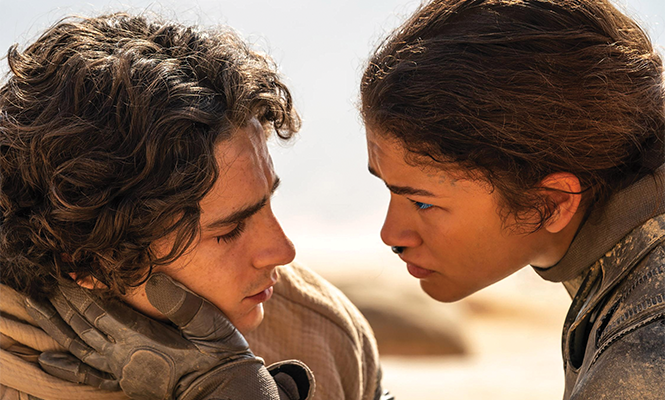Feature movie review: DUNE: PART TWO
Building a saga that actually deserves additional chapters
By Scott Renshaw @scottrenshawIn case you were expecting that a movie titled Dune: Part Two would offer more narrative resolution than you could get in Dune: Part One, you would be well-served to temper those expectations. Even after a grand total of more than five hours spent in the world of Frank Herbert's science-fiction saga, director Denis Villeneuve and his screenwriting team still leave audiences dangling, suggesting that there's more yet to come, cinematically speaking, in the story of Paul Atreides (Timothée Chalamet). It's the kind of gambit that has worked for the Marvel Cinematic Universe—well, worked for a surprisingly long time, anyway—built on the assumption that you've actually constructed a world worth re-visiting.
In this particular case, it's hard not to concede that the mission is accomplished. Villeneuve's Dune-iverse feels unusually substantial for a 21st-century genre blockbuster, not just in terms of seeming to exist physically rather than simply on a hard drive, but in crafting a tale about the intersection between religion and politics that also kicks ass as spectacle.
Part Two opens with Paul and his pregnant mother Jessica (Rebecca Ferguson) living among the desert-dwelling Fremen on Arrakis after surviving the attack on his family by the Harkonnens in Part One. It's a precarious situation for them, one that could cause a rift between two Fremen factions—one, including their leader Stilgar (Javier Bardem) that believes Paul might be a promised "messiah," and another concerned about the possibility that any outsiders might be spies. But Paul soon proves useful as a fighter in the Fremen's guerrilla war against the Harkonnen spice-mining operations, making him a target of Baron Harkonnen (Stellan Skarsgård) and his governor, Beast Rabban (Dave Bautista).
The amount of time Villeneuve and company get to explore this story allows for plenty of detail, and the richness of that details comprises a significant part of what has made both Dune chapters so effective. We're allowed a deep understanding of the Fremen as a culture, including the reverence with which they treat Arrakis's precious water, and perhaps most significantly, an understanding that—like most real-world cultures, and unlike most fantasy-world cultures—this culture is not homogenous in its beliefs. It also helps that when Paul has to undergo a rite of passage like learning how to summon and ride one of Arrakis's massive sandworms, it makes for impressively grand-scale cinema.
That commitment to a sense of awe and wonder has often been part of Villeneuve's filmmaking, and once again he delivers scenes with a distinctive flair, which is particularly impressive given how much of the action takes place against a potentially monotonous landscape of sand dunes. That's certainly true of the action sequences built around the Fremen's rebel attacks, which provide a sense of physicality both in the hand-to-hand combat and in rendering of the Harkonnen harvesters and warships. Yet Villeneuve also takes advantage of other unique settings, like the Harkonnen homeworld with its "black sun" that renders a gladiatorial battle involving the psychopathic Feyd Rautha (Austin Butler) in an unsettling monochrome—and further allows the images of a parade in the same location to evoke the black-and-white images of other fascist pomp and circumstance.
Dune Part Two ultimately starts digging pretty deeply into the idea of political leaders taking on a mantle of being divinely chosen in order to achieve their aims, and it's particularly deft at negotiating the terrain of cynical manipulation without making the true believers seem like suckers. Perhaps the movie is ultimately a touch to ambitious even with all the running time at its disposal, considering it also needs to incorporate the behind-the-scenes machinations of the emperor (Christopher Walken), his daughter (Florence Pugh), the high priestess (Charlotte Rampling) and her acolyte (Léa Seydoux). That's to say nothing of the time required to establish the romance between Paul and the Fremen warrior Chani (Zendaya), which ultimately needs to play a key role in the climax but never feels entirely convincing.
Still, Dune Part Two accomplishes far more of what it sets out to do, thematically and visually, than it falls short of doing. It's true that we're left with yet another cliffhanger, but five hours in, it's wonderful that the prospect of a third film feels more like a welcome promise than a threat.
More by Scott Renshaw
-
Film Reviews: New Releases for May 2-3
The Fall Guy, The Idea of You, Turtles All the Way Down, The People's Joker and more
- May 2, 2024
-
New film reviews and May special screenings
Music May, Napoleon Dynamite 20th anniversary, Cary Elwes talks Princess Bride and more
- May 1, 2024
-
Film Reviews: New Releases for April 26
Challengers, Boy Kills World, Humane, Alien 45th anniversary
- Apr 25, 2024
- More »




